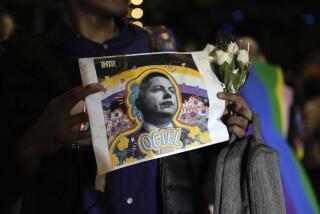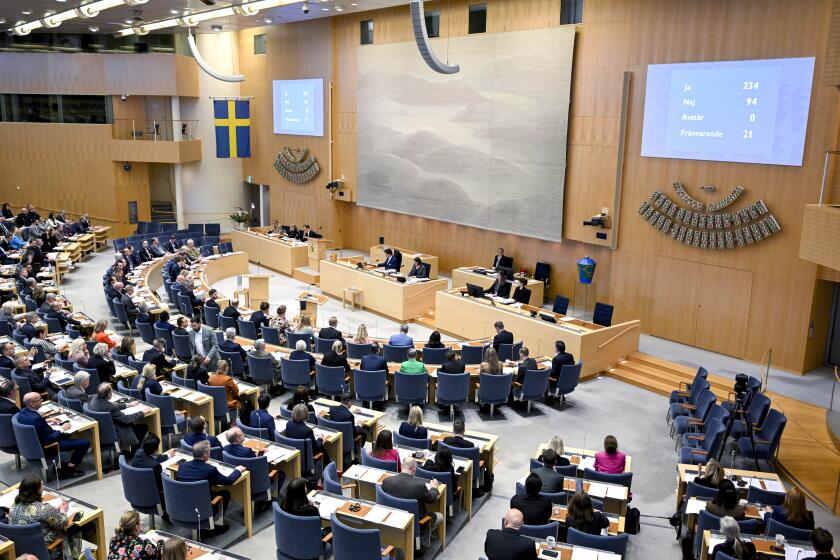Manzanar redux?
‘WHAT WILL they do to us if there is another attack? Will they intern us like they interned the Japanese?”
That is the single most common question I get when speaking about counter-terrorism policies and civil liberties to Arab and Muslim audiences. Until Wednesday, I assured them that such a response was unthinkable. The Japanese internment during World War II is now so widely recognized as morally, legally and ethically wrong, I told them, that it could not possibly be repeated.
But after a decision by a federal judge in New York, I’m no longer confident that I can be so reassuring. Dismissing a case challenging the detention of Arab and Muslim foreign nationals in the weeks after 9/11, U.S. District Judge John Gleeson ruled that it is constitutionally permissible to round up foreign nationals on immigration charges based solely on their race, religion or country of origin. What’s more, he said that they can be detained indefinitely, even after they have agreed to be removed to their home countries.
In essence, he authorized a repeat of the Japanese internment -- as long as the internment is limited to foreign nationals charged with visa violations (a group that at last count numbered about 11 million people).
The case, Turkmen vs. Ashcroft, was filed on behalf of Arab and Muslim foreign nationals swept up on the pretext of immigration charges in the weeks after 9/11. Many were initially arrested on no charges at all -- only to be served with immigration papers days, weeks or sometimes months later. All were arrested in secret -- in many cases without being allowed to contact anyone -- and hundreds were tried in closed hearings that even their family members were not allowed to attend.
They were picked up on the slightest of suspicions. In one representative case, according to the Justice Department’s inspector general, the FBI arrested several men on a tip that “too many” Middle Eastern men worked at a convenience store down the street.
Many of those arrested admitted that they had violated their visas and agreed to leave the country, but they were kept locked up for months so that the FBI could investigate them. They were not allowed to go until they were “cleared” of any connection to terrorism. In a complete reversal of the American system of justice, they were treated as guilty until proved innocent.
In all, the government detained more than 1,000 foreign nationals in the first seven weeks after 9/11, and more than 5,000 in the first two years after the attack. Yet as of today, not one of these persons stands convicted of a terrorist crime. From a security standpoint, the roundups were an utter failure.
In Turkmen vs. Ashcroft, the detainees argued that the government denied them equal protection of the law when it rounded them up on the basis of their race and religion, and violated their due-process rights when it kept them after their immigration cases were resolved. The district court rejected both claims, concluding that the government is free to detain deportable foreigners for as long as it wants as long as their ultimate removal is “reasonably foreseeable.” And the judge concluded that using race or religion to select the foreign nationals subject to such detention was neither “irrational” nor “outrageous” because the 9/11 hijackers, after all, were Arab foreign nationals belonging to an Islamic fundamentalist group, Al Qaeda.
In other words, the next time we are attacked, the government is free to round up all foreign nationals with alleged visa violations who share the race or religion of the attacker and to keep them behind bars as long as it wishes. If the attack is perpetrated by an Arab Muslim, all Arab and Muslim immigrants are vulnerable. If the attacker is a Latino Christian, the government could round up all Latino Christians with alleged visa problems.
It’s true that the World War II internment included citizens as well as foreign nationals, and in many cases, it rounded up people who had done nothing wrong. But what was most offensive about it was the fact that people were selected based on their race. And just as racial profiling of drivers is not acceptable merely because black and Latino drivers stopped are allegedly speeding, so racial profiling of immigrants is not acceptable even if the immigrants are alleged to have violated their immigration status.
WHEN THE Supreme Court in Korematsu vs. United States upheld the legality of the Japanese internment, Justice Robert Jackson warned in his dissent that the precedent would “lie about like a loaded weapon ready for the hand of any authority that can bring forward a plausible claim of an urgent need.”
Until Wednesday, I thought history had proved Jackson wrong. Virtually every living Supreme Court justice has condemned Korematsu as wrongly decided -- Justice Antonin Scalia has compared it to the Dred Scott decision of 1857, in which the court refused to recognize that slaves were “persons.” Congress has formally apologized to the survivors of the internment and paid reparations for their injuries.
Yet the Turkmen decision has taken the loaded weapon out of the closet, dusted it off and handed it to federal authorities, giving them explicit permission to let prejudice and fear run roughshod over the most basic of human rights -- the rights to equal treatment and liberty.
More to Read
Start your day right
Sign up for Essential California for news, features and recommendations from the L.A. Times and beyond in your inbox six days a week.
You may occasionally receive promotional content from the Los Angeles Times.






